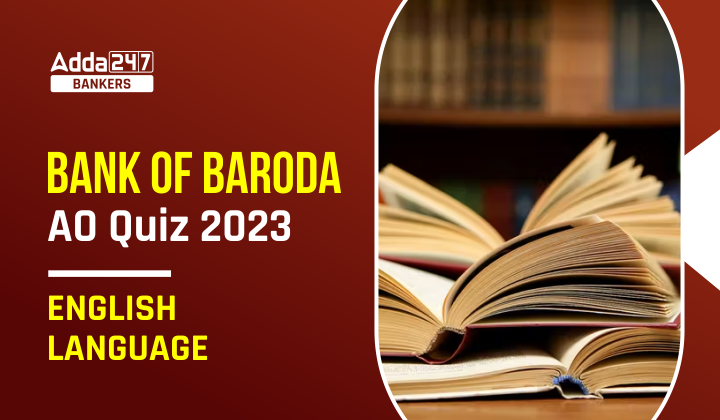Directions (1-10): In the following passage there are blanks, each of which has been numbered and one word has been suggested alongside the blank. These numbers are printed below the passage and against each, five options are given. Find out the appropriate word which fits the blank appropriately. If the word written alongside the blank fits the passage, choose option ‘e’ (No improvement required) as the correct choice.
Q1. WOMEN were significant associates (1) in the national movement. Leaders such as Sarojini Naidu, Sucheta Kripalani, Kalpana Dutt Joshi, Bhikaji Cama and Aruna Asaf Ali became designative (2) of the freedom struggle. But even more than their presence, there was widespread intricacy (3) of ordinary women from different walks of life in different regions. Many of them came out of their homes into “public life” for the first time, often inspired (4 ) by Mahatma Gandhi, who made their participation an important part of his own political execution (5) of non-violent non-cooperation.
Inevitably, these women would have had their own intellectual (6) of freedom: their goals would have been somewhat different from those of their male counterparts, and their expectations (7) of living in a newly independent country would be(8) have been coloured by their very unequal and often oppressive social and economic wealth(9). But it may still be safe to say that the writers of the Constitution did manage to predict (10) many of the hopes and dreams of the women of the time.
(a) admirers
(b) assistants
(c) participants
(d) competitors
(e) No improvement required
Q2. WOMEN were significant associates (1) in the national movement. Leaders such as Sarojini Naidu, Sucheta Kripalani, Kalpana Dutt Joshi, Bhikaji Cama and Aruna Asaf Ali became designative (2) of the freedom struggle. But even more than their presence, there was widespread intricacy (3) of ordinary women from different walks of life in different regions. Many of them came out of their homes into “public life” for the first time, often inspired (4 ) by Mahatma Gandhi, who made their participation an important part of his own political execution (5) of non-violent non-cooperation.
Inevitably, these women would have had their own intellectual (6) of freedom: their goals would have been somewhat different from those of their male counterparts, and their expectations (7) of living in a newly independent country would be(8) have been coloured by their very unequal and often oppressive social and economic wealth(9). But it may still be safe to say that the writers of the Constitution did manage to predict (10) many of the hopes and dreams of the women of the time.
(a) particular
(b) evidential
(c) significant
(d) emblematic
(e) No improvement required
Q3. WOMEN were significant associates (1) in the national movement. Leaders such as Sarojini Naidu, Sucheta Kripalani, Kalpana Dutt Joshi, Bhikaji Cama and Aruna Asaf Ali became designative (2) of the freedom struggle. But even more than their presence, there was widespread intricacy (3) of ordinary women from different walks of life in different regions. Many of them came out of their homes into “public life” for the first time, often inspired (4 ) by Mahatma Gandhi, who made their participation an important part of his own political execution (5) of non-violent non-cooperation.
Inevitably, these women would have had their own intellectual (6) of freedom: their goals would have been somewhat different from those of their male counterparts, and their expectations (7) of living in a newly independent country would be(8) have been coloured by their very unequal and often oppressive social and economic wealth(9). But it may still be safe to say that the writers of the Constitution did manage to predict (10) many of the hopes and dreams of the women of the time.
(a) ramification
(b) involvement
(c) captivation
(d) implication
(e) No improvement required
Q4. WOMEN were significant associates (1) in the national movement. Leaders such as Sarojini Naidu, Sucheta Kripalani, Kalpana Dutt Joshi, Bhikaji Cama and Aruna Asaf Ali became designative (2) of the freedom struggle. But even more than their presence, there was widespread intricacy (3) of ordinary women from different walks of life in different regions. Many of them came out of their homes into “public life” for the first time, often inspired (4 ) by Mahatma Gandhi, who made their participation an important part of his own political execution (5) of non-violent non-cooperation.
Inevitably, these women would have had their own intellectual (6) of freedom: their goals would have been somewhat different from those of their male counterparts, and their expectations (7) of living in a newly independent country would be(8) have been coloured by their very unequal and often oppressive social and economic wealth(9). But it may still be safe to say that the writers of the Constitution did manage to predict (10) many of the hopes and dreams of the women of the time.
(a) frenzied
(b) aspired
(c) enthused
(d) zealous
(e) No improvement required
Q5. WOMEN were significant associates (1) in the national movement. Leaders such as Sarojini Naidu, Sucheta Kripalani, Kalpana Dutt Joshi, Bhikaji Cama and Aruna Asaf Ali became designative (2) of the freedom struggle. But even more than their presence, there was widespread intricacy (3) of ordinary women from different walks of life in different regions. Many of them came out of their homes into “public life” for the first time, often inspired (4 ) by Mahatma Gandhi, who made their participation an important part of his own political execution (5) of non-violent non-cooperation.
Inevitably, these women would have had their own intellectual (6) of freedom: their goals would have been somewhat different from those of their male counterparts, and their expectations (7) of living in a newly independent country would be(8) have been coloured by their very unequal and often oppressive social and economic wealth(9). But it may still be safe to say that the writers of the Constitution did manage to predict (10) many of the hopes and dreams of the women of the time.
(a) strategy
(b) regulation
(c) supervision
(d) subtlety
(e) No improvement required
Q6. WOMEN were significant associates (1) in the national movement. Leaders such as Sarojini Naidu, Sucheta Kripalani, Kalpana Dutt Joshi, Bhikaji Cama and Aruna Asaf Ali became designative (2) of the freedom struggle. But even more than their presence, there was widespread intricacy (3) of ordinary women from different walks of life in different regions. Many of them came out of their homes into “public life” for the first time, often inspired (4 ) by Mahatma Gandhi, who made their participation an important part of his own political execution (5) of non-violent non-cooperation.
Inevitably, these women would have had their own intellectual (6) of freedom: their goals would have been somewhat different from those of their male counterparts, and their expectations (7) of living in a newly independent country would be(8) have been coloured by their very unequal and often oppressive social and economic wealth(9). But it may still be safe to say that the writers of the Constitution did manage to predict (10) many of the hopes and dreams of the women of the time.
(a) position
(b) notions
(c) sentimental
(d) philosophical
(e) No improvement required
Q7. WOMEN were significant associates (1) in the national movement. Leaders such as Sarojini Naidu, Sucheta Kripalani, Kalpana Dutt Joshi, Bhikaji Cama and Aruna Asaf Ali became designative (2) of the freedom struggle. But even more than their presence, there was widespread intricacy (3) of ordinary women from different walks of life in different regions. Many of them came out of their homes into “public life” for the first time, often inspired (4 ) by Mahatma Gandhi, who made their participation an important part of his own political execution (5) of non-violent non-cooperation.
Inevitably, these women would have had their own intellectual (6) of freedom: their goals would have been somewhat different from those of their male counterparts, and their expectations (7) of living in a newly independent country would be(8) have been coloured by their very unequal and often oppressive social and economic wealth(9). But it may still be safe to say that the writers of the Constitution did manage to predict (10) many of the hopes and dreams of the women of the time.
(a) purposeful
(b) condition
(c) contingency
(d) fortuity
(e) No improvement required
Q8. WOMEN were significant associates (1) in the national movement. Leaders such as Sarojini Naidu, Sucheta Kripalani, Kalpana Dutt Joshi, Bhikaji Cama and Aruna Asaf Ali became designative (2) of the freedom struggle. But even more than their presence, there was widespread intricacy (3) of ordinary women from different walks of life in different regions. Many of them came out of their homes into “public life” for the first time, often inspired (4 ) by Mahatma Gandhi, who made their participation an important part of his own political execution (5) of non-violent non-cooperation.
Inevitably, these women would have had their own intellectual (6) of freedom: their goals would have been somewhat different from those of their male counterparts, and their expectations (7) of living in a newly independent country would be(8) have been coloured by their very unequal and often oppressive social and economic wealth(9). But it may still be safe to say that the writers of the Constitution did manage to predict (10) many of the hopes and dreams of the women of the time.
(a) is
(b) will
(c) must
(d) was
(e) No improvement required
Q9. WOMEN were significant associates (1) in the national movement. Leaders such as Sarojini Naidu, Sucheta Kripalani, Kalpana Dutt Joshi, Bhikaji Cama and Aruna Asaf Ali became designative (2) of the freedom struggle. But even more than their presence, there was widespread intricacy (3) of ordinary women from different walks of life in different regions. Many of them came out of their homes into “public life” for the first time, often inspired (4 ) by Mahatma Gandhi, who made their participation an important part of his own political execution (5) of non-violent non-cooperation.
Inevitably, these women would have had their own intellectual (6) of freedom: their goals would have been somewhat different from those of their male counterparts, and their expectations (7) of living in a newly independent country would be(8) have been coloured by their very unequal and often oppressive social and economic wealth(9). But it may still be safe to say that the writers of the Constitution did manage to predict (10) many of the hopes and dreams of the women of the time.
(a) realization
(b) coherence
(c) integral
(d) circumstances
(e) No improvement required
Q10. WOMEN were significant associates (1) in the national movement. Leaders such as Sarojini Naidu, Sucheta Kripalani, Kalpana Dutt Joshi, Bhikaji Cama and Aruna Asaf Ali became designative (2) of the freedom struggle. But even more than their presence, there was widespread intricacy (3) of ordinary women from different walks of life in different regions. Many of them came out of their homes into “public life” for the first time, often inspired (4 ) by Mahatma Gandhi, who made their participation an important part of his own political execution (5) of non-violent non-cooperation.
Inevitably, these women would have had their own intellectual (6) of freedom: their goals would have been somewhat different from those of their male counterparts, and their expectations (7) of living in a newly independent country would be(8) have been coloured by their very unequal and often oppressive social and economic wealth(9). But it may still be safe to say that the writers of the Constitution did manage to predict (10) many of the hopes and dreams of the women of the time.
(a) coagulate
(b) encapsulate
(c) concentrate
(d) rehash
(e) No improvement required
Directions (11-15): Which of the following phrases (a), (b), (c) and (d) given below each sentence should replace the phrase printed in bold letters to make the sentence grammatically correct? If the sentence is correct as it is, mark (e) i.e. “No correction required” as the answer.
Q11. Pointing out the benefits of the GST within a month of its implementation, Modi said that goods are being transported much faster, highways have become clutter-free and pollution levels had gone down and increased speed of trucks.
(a)are being down with the decreased
(b)have come down with the increased
(c)have been went down because of decreasing
(d)is getting down due to decreased
(e)No correction required
Q12. Washing your hands at regular intervals could be the most effective method to staying healthy and protecting yourself from various ailments.
(a)is the most effective way of staying
(b)can be the most effective way to stay
(c)has the effective effect to stay
(d)has been the effective way in staying
(e)No correction required
Q13. Quite a few research institutes are growing in free India bearing the names of scientists winning recognition of Western countries, mainly Europe.
(a)has grown in free India who bears the names of
(b)have grown up in free India whose bears the names of
(c)grew up in free India bearing the names of
(d)had come up in India which bears the names of
(e)No correction required
Q14. Southeast Asian countries today are far more integrated than they have ever been in the modern history of the region, but ASEAN has some way to go before it can call itself a real community.
(a)though ASEAN has something to do
(b)as ASEAN had some places to go
(c)while ASEAN have to go some other way
(d)so that ASEAN have to go
(e)No correction required
Q15. The success of Mithali’s squad has generated fresh interest in the women’s game in India, and as various goodies has been dangled many are calling for a female equivalent of the IPL.
(a)although various goodies are being dangle
(b)beside various goodies are dangle
(c)various goodies is being dangled
(d)apart from various goodies being dangled
(e)No correction required
Solutions
S1. Ans. (c)
Sol. Participants is the correct option to be replaced as the paragraph is about women involving themselves in freedom struggle.
S2. Ans. (d)
Sol. Emblematic is the correct word as it has been mentioned that these women took part in the freedom struggle and hence they are symbolic of freedom struggle.
S3. Ans. (b)
Sol. “involvement” is the correct word replacement as it means the fact or condition of being involved with or participating in something.
Intricacy means very complicated or detailed.
Ramification means a complex or unwelcome consequence of an action or event.
S4. Ans. (e)
Sol. “inspired” is the correct word in context of its usage in the sentence. So it doesn’t require any improvement.
S5. Ans. (a)
Sol. “Mahatma Gandhi has made his own political strategy of non-violent non-cooperation” makes the correct phrase in terms of adding meaning to the sentence. Hence ‘strategy” is the correct word replacement.
S6. Ans. (b)
Sol. Notion means a conception of or belief about something. Hence it makes a better sense in context of adding meaning to the sentence.
S7. Ans. (e)
Sol. “expectations” is the correct word in terms of its meaning and usage. So it doesn’t require any correction.
S8. Ans. (c)
Sol. ‘must’ is the correct verb to make the sentence grammatically correct.
S9. Ans. (d)
Sol. “circumstances” is the correct word replacement as it means a fact or condition connected with or relevant to an event or action. Moreover, “social and economic” in the sentence suggests that the noun it defines should be in plural number. Hence (d) is the correct option.
Coherence means the quality of being logical and consistent.
S10. Ans. (b)
Sol. “encapsulate” is the correct word replacement as it means express the essential features of (something) succinctly.
Coagulate means cause to change.
Rehash means to reuse.
S11. Ans. (b)
Sol. “have come down with the increased” is the correct phrase to make the sentence grammatically correct as the sentence is in Present Tense. It is to be noticed that the speed of trucks can’t be decreased as it is clearly mentioned that the highways have become clutter-free. Also, the phrasal verb “come down” means collapse or be demolished. Hence (b) is the correct option.
S12. Ans. (a)
Sol. “is the most effective way of staying” is the correct phrase to make the sentence grammatically correct as the sentence is in generalized and factual form. Thus the use of “could” or “can” is incorrect in this case. Moreover, the phrases connected with the conjunction “and” should be in similar form. Hence among the given options, only option (a) has the correct grammar structure to correctly fit into the sentence.
S13. Ans. (c)
Sol. “grew up in free India bearing the names of” is the correct phrase to make the sentence grammatically correct as the sentence refers to the event related to the past. If we go by options, options (a), (b) and (d) are not in accordance with correct grammar structure. Only option (c) possesses correct syntax to supplement its usage in the sentence. The phrasal verb “grew up” means became an adult.
S14. Ans. (e)
Sol. The given sentence is grammatically correct. It is to be noted that the sentence is not conditional and thus all the given options are incorrect.
S15. Ans. (d)
Sol. “apart from various goodies being dangled” is the correct phrase to make the sentence grammatically correct. Options (b) and (c) can be easily eliminated as they lack the correct syntaxes and similarly option (a) as the sentence is not conditional. Option (d) fits into the sentence quite correctly as it adds meaning to the sentence. The phrasal verb “apart from” means in addition to; as well as. Hence (d) is the correct option.
Click Here to Register for Bank Exams 2021 Preparation Material





 English Language Quiz For Bank of Baroda...
English Language Quiz For Bank of Baroda...
 English Language Quiz For Bank of Baroda...
English Language Quiz For Bank of Baroda...
 English Language Quiz For Bank of Baroda...
English Language Quiz For Bank of Baroda...

